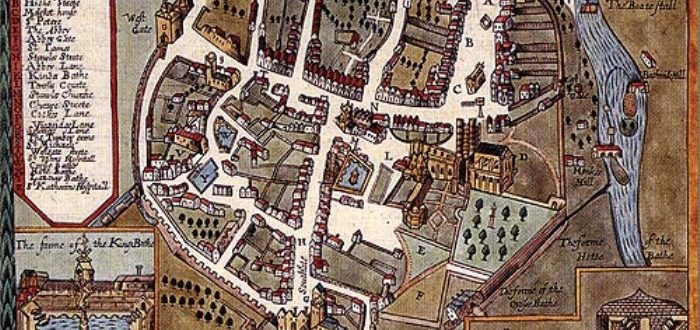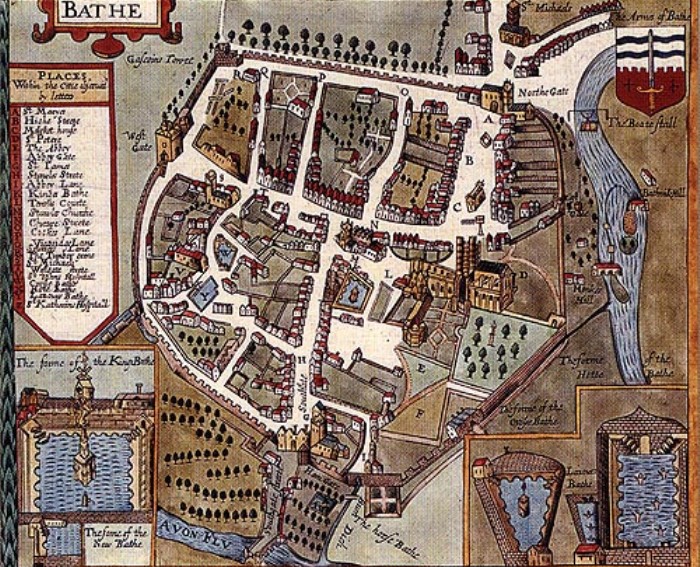24-30 November 1414: Royal Grants to the Towns
By Dan Spencer
This week in 1414 saw a number of royal grants to towns in England.
On 24 November the king confirmed charters granted to Bath by letters patent. Bath’s original charter dated back to Richard I’s grant of 1189 which gave freedom from tolls and liberties for the Merchant Guild. However upon the accession of a new monarch, towns often felt the need to send delegates to the king to ensure that they kept their freedoms and were prepared to spend sizeable sums of money to do so. The citizens of Bath paid £10 to the keeper of the hanaper for the privilege of having their existing charters confirmed but it was certainly considered money well spent.
Representatives of Bath were at the parliament which had begun on 19 November at Westminster. They were William Radstock and Richard Widecombe(or Wydecombe). Radstock was described as an inn keeper in a business transaction with Richard Aylmer, a London merchant, in October 1415.
Widecombe had already served as a parliamentary burgess for Bath in the first parliament of Henry V’s reign and was to serve at seven future parliaments to 1431. He held property in the town, and was bailiff of the town in 1405-6 and mayor in 1417-18, 1426-7 and 1428-9. It is likely he was a major player in the gaining of the royal charter. The prior and convent of Bath (now Bath Abbey) were always keen to maintain their authority in the town. This led to minor disputes with the townspeople. One of these occurred during Wydecombe’s first mayoralty. The priory claimed the right to ring their bell first as a signal for the citizens’ bells to ring, but under Wydecombe the citizens had taken to ringing their bells before that of the prior.
From the twelfth century onwards, English kings had granted charters to favoured towns, which granted them important rights such as fee farms, freedom from tolls, local courts and a degree of local governance free from the interference of royal servants. This had a number of important benefits to these communities including the encouragement of trade and industry, as well as helping to shape urban identities. Furthermore, as we have already seen with the case of the city of Salisbury, towns in receipt of such privileges were expected to support the king in military enterprises, with money and soldiers. The town authorities, drawn from the wealthier burgesses, typically consisting of an elected mayor together with a council of aldermen, often obliged. Additional military services were provided by the Cinque Ports, a confederation of towns in south-east England, which had been granted special privileges in the twelfth century.
In the same week, on 27 November, a royal grant of pontage was given for five years to the small towns of Cookham and Bray in the eastern part of the county of Berkshire, to support the repair of the bridge at the town of Maidenhead. In time this led to the greater prosperity of Maidenhead and to the detriment of Cookham and Bray.
Pontage was the grant of a toll specifically to raise money for the repair of bridge for a set length of time. These grants were certainly not uncommon; in the previous year (1413) three grants of pontage were made to towns in Buckinghamshire, Surrey and Wiltshire. Visitors to these towns who used their bridges would be expected to pay this toll, possibly in conjunction with other tolls including murage (for the construction or repair of walls) and pavage (for the paving of roads). Burgesses of towns which had been granted exemptions from tolls (as with Bath) would not have to pay these fees. Therefore this was potentially a valuable right to possess!
This information came from A. L. Brown, The Governance of Late Medieval England 1272-1461 (London: Edward Arnold, 1989), p. 152; Lorraine Attreed, The King’s Towns: Identity and Survival in Late Medieval English Boroughs (New York: Peter Lang, 2001), pp. 33-35; The Calendar of Patent Rolls, 1413-1416, pp. 18, 155, 161, 252, 256; Widcombe (Wydecombe), ‘Richard, of Bath, Som.’ in The History of Parliament: the House of Commons 1386-1421, J. S. Roskell and C. Rawcliffe (eds) (Woodbridge: Boydell, 1993), available from http://www.historyofparliamentonline.org/volume/1386-1421/member/widcombe-%28wydecombe%29-richard
Image is of John Speed’s map of Bath, published in 1610, taken from Wikipedia and is in the Public Domain

